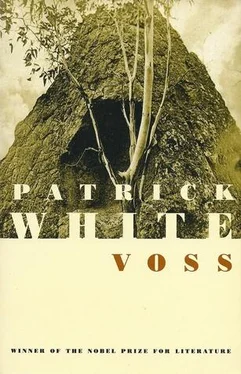‘It is not that German’s.’
‘It is his by right of vision,’ answered the young woman.
‘What is that?’
She was trembling. She could not say.
It is unlike Laura, felt her Aunt Emmy.
‘Here we are talking about our Colony as if it did not exist until now,’ Mr Bonner was forced to remark. ‘Or as if it has now begun to exist as something quite different. I do not understand what all this talk is about. We are not children. We have only to consider the progress we have made. Look at our homes and public edifices. Look at the devotion of our administrators, and the solid achievement of those men who are settling the land. Why, in this very room, look at the remains of the good dinner we have just eaten. I do not see what there is to be afraid of.’
‘Do not worry, Laura,’ said Aunt Emmy. ‘Is your head not better, dear?’
‘Why my head?’ asked Laura.
People were looking questions at her. The glances of some of them even implied that she was of the same base metal as the German.
‘Oh, my head,’ she remembered. ‘Yes. No, it is better, I think.’
Though presently, when they had got up from the table, she went away to her room.
SUSSEX STREET was not yet set so rigid that a cock might not shatter its importance, or blunt-nosed bullock, toiling over ruts, snuff at the dusty urban air, or piano scatter its distracted notes, from the house of Topp, Professor of Music, which was situated halfway down. The house itself was rather solemn, awkwardly conceived and executed, lacking in the grandeur which stone should create, for stone it was, honestly revealing how painfully it had been hewn. There in its almost weathered sides were the scars where the iron had entered in, like livid ribs, and in certain lights the dumpy house suggested all suffering. The rooms were agreeable enough, although centipedes would invade in the course of a humid summer, and green mould grow upon the boards, to the extent that Mrs Thompson, the old woman who attended to the needs of Topp, the proprietor, and any lodger, would begin to complain about her bones. How she would complain; but Topp was fortunate, his friends ventured to suggest, to have secured the services of a decent widow, without encumbrances, as it is said. Certainly there were sons, but distributed, and at a distance, where they were engaged in clearing and populating their adopted land. Primitive in appearance and of classic behaviour, her employer suspected the old woman of being the original Thompson. Often at evening, after tidying her excellent person, she would declaim the Thompson narrative for poor Topp, who had listened so often he had learnt to prompt the voice of legend. But they were both, perhaps, comforted.
Topp, the music master, and a single gentleman, was comparatively silent and unprolific. He was a small, white, worried man, with small, moist, white hands, shameful in that country of dry, yellow callouses. All he made was music, for which he was continually apologizing, and hoping he might not be called upon to explain what useful purpose his passion served. So he would hurry past the doorways of hotels, from which laughter came, and dream of an ideal state in which the official tongue was music. Although he taught the pianoforte, visiting select homes during the morning hours, Topp played the flute for pleasure. Exquisite, pearly, translucent notes would flower on that unpromising wood, and fall from the windows as they faded, causing bullock teams to flick their tails, or some drunkard to invoke Jesus Christ. On days when Topp played his flute the dumpy house was garlanded with music, and it did sometimes happen that people passing in the street, through dust or mud, would grow gladder without thinking to discover why.
To Johann Ulrich Voss, lying on the iron bed in one of the two upper rooms for which he paid the music master, the music was also homage of a kind. At intervals he might lift a hand, graciously acknowledging a phrase, but out of that great distance to which he was so often withdrawn. Men came to see him now, going straightway up the narrow stairs, or waiting in the street, on step or mounting-block, if the German happened to be from home. He is about the business of this great expedition, the old woman Mrs Thompson would explain on such occasions, and did also let it be understood that she could have revealed the nature of that business, only discretion would not allow. Go up, though, my dear, and make yourself comfortable, we are long enough on earth, she advised those she favoured. Or: Wait, she would command of those she suspected; this is a gentleman’s rooms, let me remind you, not a cockpit; if you will rest a while upon the step, you will find it clean, God knows, scrubbed down every day, and the weather permittun.
In the absence of the German, Harry Robarts was always forced to wait upon the steps. It was not that she disliked the lad, just that she could not take to him, poor fellow, with his wide mouth and reddish cheeks. Christian though she was, or hoped, she could not let her health suffer by sympathizing unduly with every simple boy; there were limits to what a widow might be expected to bear.
One evening that spring, when the street was already dissolving, and amiable pedestrians were calling to one another in friendship, and Topp’s pupil had caught the brilliance of the sunset if only for a few bars, Harry Robarts came to Voss, and ran up the stairs unimpeded by Mrs Thompson, because her gentleman was there. The boy went in and found his friend examining a list, of ropes, and waterbags, and other tackle, as well as an increased quantity of flour, for which the German had yet to contract with recommended firms.
‘It is me, sir,’ panted the lad, twirling a cap of kangaroo skin that he had bought from a hawker on landing in the Colony.
‘What is it, then?’ asked the German, and continued to suck the end of a beautifully sharpened lead pencil.
‘Nothing,’ said the boy. ‘I came. That is all.’
The German did not frown, as he might have in other circumstances, at other people. Poor Harry Robarts was an easy shadow to wear. His wide eyes reflected the primary thoughts. Voss could sit with him as he would with still water, allowing his own thoughts to widen on it.
So that, if he was weak in wit, Harry did enjoy certain other advantages. And muscular strength too. He was white-skinned, but heavy-shouldered. For one instance, there was the mahogany box, the corners bound in brass, the hasps brass, and handles jangling with the same metal, in which the German kept his things. At the shipside on London River, in the stench of green water and rotting fruit, Voss had stood looking at his box. He would, in fact, often experience fits of humiliating helplessness in the face of practical obstacles. In the night, and light off green, lisping water, it seemed that he would never free himself from his inherent helplessness, when Harry came, uninvited, out of the darkness, asked what it was, swung the box — it could have been a canvas thing — upon his shoulder, glad to offer his services to someone who might think for him. He was all breathless, not from the weight, but from enthusiasm; was he not embarked for new worlds in that same vessel as the gentleman? All that night in the black ship, beneath the swinging lanterns, Voss felt weak with knowledge, and the boy beside him strong with innocence.
Harry stuck to Voss. The German explained to him the anatomy of the flying fish, and named the stars. Or Harry would perform feats of strength, without his shirt, his white skin now ablaze with the tropics; he would stand on his hands, or break the links of a chain, not through vanity, but in an exchange of gifts.
Harry was always present, until Voss accepted it, and afterwards at Sydney, when he was not at work — he had been taken on as a carrier’s lad — would run up the stairs, when the German was at his lodging, and say in one breath, as on the present occasion:
Читать дальше












